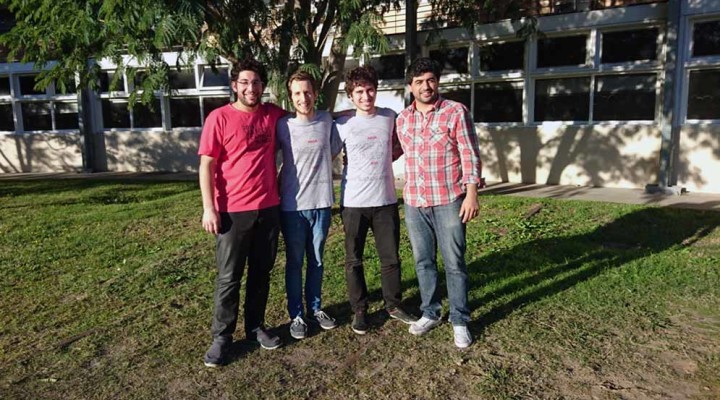TECHNOLOGY
Argentine scientists create an app to help allergic people
Octavio Gianatiempo, CONICET fellow, is one of the members of a team awarded by the NASA for the development of an app to trace the routes with less pollen.
In summer, the streets of Buenos Aires are full of plane trees in bloom that release their pollen and volatile particles that trigger a response in allergic people.
Octavio Gianatiempo, CONICET’s doctoral fellow at the Facultad de Ciencias Exactas y Naturales (FCEyN) of the Universidad de Buenos Aires (UBA); Franco Bellomo, Atmosphere Sciences student at the UBA; Carlos Augusto Frías, journalist; and Cezar Henrique Azevedo de Faveri, Computer Sciences student at the FCEyN at the UBA are part of a group called Lemon Py, which won the Best Use of Data Award given by the NASA Space Apps Challenge 2017.
“We met at the competition, I told my mates about the dataset on the city trees and that encouraged us to question how to complement that information with the NASA data to create something useful for citizens. Franco, who had read about satellite images, told us about the Normalized Difference Vegetation Index (NDVI) so new ideas emerged and each of us made contributions from our areas of expertise”, Gianatiempo explains.
Lemon Py proposed the development of a tool that through the use of satellite information can identify plain trees’ bloom periods and determine the pollen and volatile particles dispersion pattern to design the ‘safe routes’ for allergic people.
The idea emerged during the Hackaton organized by Nasa Space Apps Challenge, which was held on April 29th and 30th of this year at the Universidad Nacional de San Martín, Campus Miguelete. For 48 hours, 13 teams competed in Buenos Aires to produce ideas to respond to the 25 challenges posed by the American space agency.
“The original idea changed as we worked. This is the benefit of a multidisciplinary team: several points of view to face the same problem. The short time we had was an extra challenge. In my case, I was in charge of a huge amount of information and was the link between the team and the coaches of the event”, Frías adds.
“Almost 10% of the trees in Buenos Aires are of the Platanus genus. These tress produce a great amount of pollen that can cause allergy. Our app shows the temporal space distribution of the allergen and traces the route so that the person can reach their destination minimizing the exposure to pollen”, the researcher describes.
“During the competition, we had to learn a lot about trees and the images in a short period of time, and the main challenge was to interpret the metadata of the images and the projections of the coordinates. Finally, to condense everything we did in one short presentation was also a difficult task, but thanks to the team work, we managed to have it”, Gianatiempo explains.
According the Nasa Space Apps Challenge newsletter, Lemon Py and the other four winning teams in the categories Best Use of Hardware, Best Mission Concept, Galactic Impact, Most Inspirational and the People´s Choice Award, from Ivanovo, Rusia; Taipei, Taiwan, Singapur, Kuala Lumpur, Malaysia; and Limassol, Chipre, are going to be invited by the NASA to attend a rocket launch.
Octavio Gianatiempo is a CONICET’s doctoral fellow at the Chemical Biology department of the Facultad de Ciencias Exactas y Naturales of the UBA, under the direction of Eduardo Cánepa, CONICET’s principal researcher. He studies the alterations of epigenetic mechanisms involved in the regulation of early expression genes’ transcription and their role in the cognitive impairment derived from perinatal nutritional stress.
| Video Project presentation |
